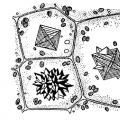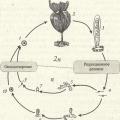Troparion Life-giving Cross, that is, the chant of the Feast of the Exaltation of the Cross is one of the most famous prayers. It is often performed in churches; it is included in the rite of the water-blessing prayer service and in the morning prayer rule. But meanwhile, this troparion has a dramatic fate. Due to historical circumstances, its text has undergone changes. Moreover, two versions of prayer have become established in liturgical practice.
Here's what the first one sounds like:
“Save, O Lord, Thy people, and bless Thy inheritance, granting victories against resistance, and preserving Thy residence through Thy Cross.”
The second option contains a clarification: “giving victory to Orthodox Christians against the resistance...”. Both texts are equally valid. As a rule, one temple adheres to one option.
In this prayer, the Church asks that the Lord deliver us, Orthodox Christians, from troubles and misfortunes, grant us prosperity, the strength to defeat all violators of the security of the state, and protect us with His Cross.
But the fact is that until the spring of one thousand nine hundred and seventeen the troparion to the Life-giving Cross sounded completely different.
Previously, it was called: “Troparion of the Cross and prayer for the Tsar and the Fatherland,” and its text was as follows: “Save, Lord, Thy people, and bless Thy inheritance; victory to our Blessed Emperor Nikolai Alexandrovich, granting victory against resistance, and preserving Your residence through Your Cross.”
After the abdication of Nicholas II, the new authorities demanded that the text of the prayer be revised. For the first time, the Synod of the Russian Orthodox Church faced such a challenge, so it made concessions; the lines about the emperor were replaced with the blessing of the Provisional Government.
After the October Revolution, prayer for a government that openly proclaimed atheistic views was impossible.
Meanwhile, prayer for the Tsar and the Fatherland formed the semantic core of the entire Exaltation service. After all, the event underlying the holiday, the discovery of the Holy Cross of the Lord, occurred thanks to the personal faith and political will of Emperor Constantine the Great.
He single-handedly stopped the usual course of the state machine of the Roman Empire: he stopped more than two centuries of persecution of Christians, began to build legislation on the basis of Christian ethics, and openly glorified the victorious power of the Cross of the Lord. Constantine lived by Christ and faith.
In prayers to the Cross, the Church reminds that Christ must be at the center of any state. She openly talks about her ideal of a socio-political structure - a symphony, that is, harmony, collaboration between the Church and the state. So in the kontakion of the Exaltation of the Cross, a short hymn for the holiday, the Church asks: “To your namesake new residence” - that is, “to your new state, which bears your name” “grant Thy bounty, O Christ God.”
There is an opinion, in particular supported by St. John, Bishop of Shanghai, that in the home prayer rule it is permissible to recite the original version of the troparion to the Cross. The saint believed that this was a prayer for the faithful kings of future eras.
In the name of the Father, and the Son, and the Holy Spirit.
“Save, O Lord, Thy people and bless Thy inheritance, granting victories against resistance and preserving Thy residence through Thy Cross.”
Today is the Feast of the Exaltation of the Honorable and Life-Giving Cross of the Lord. So why do the Orthodox reverence the Cross so much, since it was the instrument of execution of the Savior? - Because this is the key that opened paradise, which was closed to each of us because of Adam’s original sin. Every Sunday you and I sing: “Having seen the Resurrection of Christ... joy came through the Cross to the whole world.”
And on today’s special day - the day of the Exaltation of the Holy Cross, one is supposed to sing “The Resurrection of Christ,” although today is not Matins on Resurrection Day. Why? - So that we know that behind Calvary, the Crucifixion and the death of the Savior was His Resurrection and that this will happen to each of us, no matter what sorrows, illnesses and trials each of us endures in our lives. This holiday is both joyful and sad for us, because we remember the suffering and death of our Savior, thanks to which you live and I live. If it were not for the Cross of the Lord, it is unknown whether there would be hope of eternal life for each of us. But we saw the Resurrection of Christ, albeit not with our physical eyes, but with the eyes of faith, which the Lord gave us as a priceless treasure. In the Gospel He says: “Walk while there is light, lest darkness overtake you” (John 12:35) - i.e. walk in the light of love, the light of grace, faith, in the light of good deeds, so that darkness does not overtake each of us. And when the Cross of the Lord is erected, let each of us think about our lives: are we not crucifying our Lord with our deeds and sins. So let's repent, because hardly anyone will say that he has not sinned. Each of us must also learn one seemingly small, but in fact the greatest truth.
One day a friend of mine, a hieromonk, came to see me, who had gone through a difficult ordeal in his life - he was slandered, he was demoted from the abbot of the monastery, vile articles appeared in the newspapers. He said: “I barely survived it all, because an incredible change happened, literally the whole city turned away from me. But at one fine moment I realized that neither prayer, nor church, nor the Gospel, nor our inner desire in life to become better can change us. As the Apostle wisely said in his epistles, we must have the character of Christ. If a person does not have the spirit of Christ, then he will not see Christ Himself. But character and disposition are developed not by our thoughts, not by some of our efforts and aspirations, but by circumstances. “So if sorrow comes, know that it is the Lord who takes you to heaven.” This is what my friend concluded from what happened to him.
Elder Anatoly Optinsky said: “At the end of your life, you will thank God not for joys, but you will thank God for sorrows.” If you suddenly found yourself in heaven, you would see that the saints are holy with humility, and you would say: “Lord! Bring me back to earth, because I do not yet have the character of Christ,” which is nurtured, created and grows in our soul only through sorrows. But sorrows with God, with the Cross, with the Gospel, with faith are surmountable and victorious. They do not have the same power over us that they have over people without faith and trust in God.
And on this holy day, may our hearts respond at least a little to God’s love, and we will love sorrows, love the Cross, faith, and our own soul. And then we will be Christians not only in name, but everyone will see that we are children of a loving Father, we are children of the God of Love. And help us all with this, Lord!
Amen.
Archimandrite Melchizedek
St. John of Shanghai. Save, Lord, Your people
Why are prayers for kings combined with prayers to the Life-Giving Cross?
The Cross of the Lord, as an instrument of our salvation, began to be revered by Christians even in Apostolic times. However, during the persecution of Christians, his veneration could only be secret. “Christ crucified” was a temptation for the Jews, and madness for the pagans. Therefore, Christians did not openly express their veneration of the Cross, so as not to expose Him to mockery. They hid the image of the cross or depicted the cross in such a way that the pagans could not guess that this drawing covertly depicts a cross.
In 312, Tsar Constantine the Great, during his campaign against Rome, saw in the sky an image of a cross with the inscription - NIKA, that is, conquer. Having made a military banner in the form of a cross, Constantine entered the battle, defeated the enemy and took Rome. In memory of that victory, Tsar Constantine ordered that his image with a cross in his hand and the inscription “With this saving sign I freed Rome from the tyrant” be placed in Rome. Soon after this, the Christian profession was declared permissible by the Edict of Milan; Tsar Constantine himself set an example of veneration of the cross, ordering to depict himself with a cross even on coins.
King Constantine's vision of the cross in heaven was repeated two more times during his further campaigns, which further strengthened his veneration of the Holy Cross.
At his request, his mother, St. Queen Helena took a trip to Jerusalem and there she found the removed Life-Giving Cross. She brought part of it to Constantinople, and the Byzantine kings, going on a campaign, took it with them, trusting in God’s help given through the Cross.
That is why, in wonderful chants glorifying the Holy Cross, he was also praised for the help that Orthodox kings received through him.
At the same time, Orthodox Church, fulfilling the instructions of the Apostle Paul to pray for kings, even pagan ones, since they are defenders of order and not persecutors of the Faith, she always offered up a prayer to God so that the power of the Cross would help the kings who trusted in the Cross. Services of the Holy Cross on Wednesdays and Fridays, on which days the sufferings of Christ are remembered, and on other holidays of the Life-Giving Cross are full of such prayers. They say: “The cross of kings is a power,” “our most faithful kings boast about You, because by Your power the Ishmaelite people are powerfully punishing,” “the faithful king grants victories to the resistance and Yours preserves residence by Your Cross,” “the tree of honor gives victory to the king to the barbarians.” “... The service of the Cross is filled with such and similar expressions.
It is remarkable that many of these hymns were written by the Holy Fathers, who themselves suffered cruelly from the iconoclast kings; they did not stop praying for the kings, firmly believing that after the evil kings there would be pious kings.
The Orthodox Greeks and Southern Slavs did not change those prayers even when under the rule of the Turks or other foreign authorities, even if they were of other faiths.
What is the meaning of praying for kings in prayers to the Holy Cross when any Orthodox people do not have their own king?
Firstly, Orthodox peoples must pray not only for their Sovereigns, but as members of one body - the Church, also for other Orthodox Sovereigns. Greeks, Serbs, Bulgarians and Romanians enslaved by the Turks prayed for the then only Orthodox Russian Tsar. It is the duty of Russians to pray not only for their own people, but also for their sovereigns, especially since Russian refugees living in their countries enjoy their protection.
Secondly, when offering prayers for kings, we pray not only for current kings, but also for future Orthodox kings, for according to the interpretation of St. John Chrysostom, Orthodox rulers will hold power until the coming of the Antichrist, restraining the spread of evil. This is why the Orthodox Church does not stop praying - victory by the blessed king against the resistance, granting. These words are found in the prayer to the Life-giving Cross, which is especially often used, since it is a troparion, that is, a kind of hymn, for the days of the Holy Cross.
The first words of that prayer are verse 9 of Psalm XXVII of David, and the words that follow are taken from Psalm 143, written by David regarding the fight against Goliath.
It was first composed as a sedalion of the octochoic (octoecho) for singing on Wednesdays and Fridays of the 1st tone between the reading of the kathismas of the Psalter. Then it began to be used also as a troparion of those days, the Feast of the Exaltation of the Cross and other days dedicated to the Holy Cross.
It is also read at the beginning of every daily Matins, sung at the small blessing of water and on many other occasions.
In Russia and in some other Slavic countries, the name of the reigning Sovereign was also inserted into that prayer, but the main content always remained unchanged and its original text is what the Holy Fathers wrote:
Save, O Lord, Thy people and bless Thy inheritance, granting victories to the blessed king against the resistance, and preserving Thy residence through Thy Cross.
With V. John of Shanghai
In 1993, when I just came to the Church. I don’t remember where, I got an old prayer book. And in it, in the troparion to the cross, the word “Orthodox” was present, that is, there was the phrase “... granting victories to Orthodox Christians against resistance...”. Question: Or are these features of that prayer book or was this word excluded later for some reason? Also, in the penultimate prayer for going to bed for those coming, the one that precedes the confessional prayer, after the sentence “For those who travel,” it said: “For Orthodox Christians, help,” I have not seen this sentence in other prayer books. The question is the same as in the first case.
Hieromonk Job (Gumerov) answers:
The Troparion to the Cross was written in the 8th century by St. Kosma, Bishop of Maium, co-pupil and friend of the Venerable. John of Damascus: Save, O Lord, Thy people and bless Thy inheritance, granting victories to the blessed king against the resistance, and preserving Thy residence through Thy cross. This short chant expresses not only faith in the all-conquering power of the Cross, but also an indication of its sign in the sky with the Greek inscription “ win sim"(touto nika), which St. saw. Constantine the Great and his soldiers. In the Greek text and the ancient period in Rus' it was sung king(no name). In Russia during the Christian monarchy they sang: to our pious emperor(Name). After the end of Christian statehood, the troparion changed: Orthodox Christian . Sometimes these words are omitted without proper reason. Also in prayer Those who hate and offend us a change has occurred.




